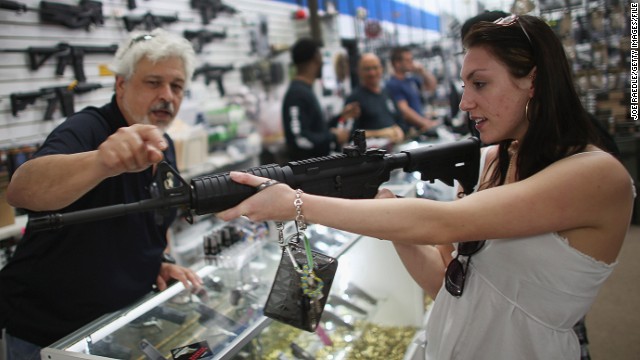 The busiest shopping day of the year also saw a major boom for gun
sales, with the federal background check system expected to set a record
of more than 144,000 background checks Friday, according to the FBI.
The busiest shopping day of the year also saw a major boom for gun
sales, with the federal background check system expected to set a record
of more than 144,000 background checks Friday, according to the FBI.
The staggering number of
checks -- an average of almost three per second, nearly three times the
daily average -- falls on the shoulders of 600 FBI and contract call
center employees who will endure 17-hour workdays in an attempt to
complete the background reviews in three business days, as required by
law, FBI spokesman Stephen Fischer said.
"Traditionally, Black Friday is one of our busiest days for transaction volume," Fischer said.
On average, more than 500
gun background checks a day fail because of incomplete information
required for a decision, according to the FBI's National Instant
Criminal Background Check System, which is responsible for checks on
firearm purchases from federally licensed shops.
Officials estimate that
about 3,000, or 2%, of the more than 144,000 Black Friday background
checks will not be completed because of insufficient information from
records such as court documents.
Employees of the
background check agency, who work every day but Christmas, will work
through the weekend to vet Friday's purchases.
As of 2 p.m. Friday, the
agency had processed more than 94,000 transactions, on pace to surpass
last year's 144,758, Fischer said
"We are averaging three
checks per second," he said. "The challenge is to have staff keep up
with this volume. We do that by limiting personal leave, asking
employees to work extra shifts and reutilizing former ... employees to
serve in NICS during this busy period."
The agency brings in 100 extra employees to deal with the increase.
"This means saving lives
and protecting people from harm -- by not letting guns fall into the
wrong hands," FBI Manager Kimberly Del Greco said in a statement. "It
also ensures the timely transfer of firearms to eligible gun buyers."
Overall, about 186,000
background checks a year cannot be completed, according to the FBI. It's
difficult to know exactly how many gun sales are authorized from that
number because whether to make the sale is ultimately in the hands of
the shop owner.
Last year, the agency completed 21 million background checks, and about 1.1% of those purchases were denied, the agency said.
Firearm background checks have doubled from the more than 9 million conducted when the system was implemented in 1999.
Ten factors can
disqualify a purchase: felony conviction, arrest warrant, documented
drug problem, mental illness, undocumented immigration status,
dishonorable military discharge, renunciation of U.S. citizenship,
restraining order, history of domestic violence or indictment for any
crime punishable by longer than one year of prison.
Gun purchasers are
required to fill out a form from the Bureau of Alcohol, Tobacco,
Firearms and Explosives with basic identification information and
questions about the 10 disqualifying factors.
The gun shop can read
the information to the background check agency over the phone or run the
information through a secure Internet connection. The check sometimes
involves calling courthouses to get records and dispositions.
"We won't make a determination unless we are absolutely sure," Fischer said.
However, the agency cannot deny a transaction based on an arrest without knowing the disposition of a case.
After the three business
days have passed, completion of the sale becomes the prerogative of the
licensed gun shop owner, according to the Brady Handgun Violence
Prevention Act of 1998
Fischer said major
retailers such as Walmart, Dick's Sporting Goods, Cabela's and Gander
Mountain usually won't go through with the sale without complete
information.
No comments:
Post a Comment